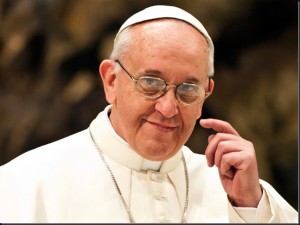
By Susan Gately - 13 September, 2013
 God is not an idea. He does not depend on our thoughts, but is a reality with a capital ‘R’, Pope Francis wrote in an Italian daily newspaper this week in what is seen as opening a dialogue with non-believers.
God is not an idea. He does not depend on our thoughts, but is a reality with a capital ‘R’, Pope Francis wrote in an Italian daily newspaper this week in what is seen as opening a dialogue with non-believers.
On 7 July, the editor of La Reppublica, Eugenio Scalfari, a non-believer who admits to being “fascinated by the preaching of Jesus of Nazareth,” put a number of questions to the Pope.
“Does God forgive non-believers? Does absolute truth exist? Is God merely a creation of the human mind?”
This week, Pope Francis responded with a 2,500 word open letter, in which he described his own discovery of faith as a meeting with Jesus.
This meeting, which gave meaning to his existence, was made possible by the community of faith in which he lived. He discovered Scriptures, the Sacraments, fraternity with everyone and service to the poor.
“Without the Church I would never have been able to meet Jesus,” the Pontiff said.
Referring to the Gospel of Mark, Pope Francis said that Jesus preached with authority, healed, called disciples “things that, in the Old Testament, belong to God and only God”.
His authority was not to exercise power over others, but to serve them, and then he staked his own life, to the point of being “left abandoned on the cross”.
“But Jesus remained faithful to God, up to his death.” When he rose, it was not to be “triumphant over those who refused him”, but to “certify that the love of God is stronger than death”.
“Christian faith believes in this: that Jesus is the Son of God who came to give his life to open the way to love for everyone.”
The La Repubblica editor had asked the Pope if Christian faith was different to other religious faiths. In response, the Pope said Christianity “allows us to participate, in Jesus, in the relationship that He has with God who is Abba,” and because of this “in the relationship that He has with all other people, including enemies, in the sign of love.”
Asked about the promise made to Jews, Pope Francis replied that the Jewish people were the “the holy root from which Jesus originated.”
“God has never stopped believing in the alliance made with Israel and that, through the terrible trials of these past centuries, the Jews have kept their faith in God. And for this, we will never be grateful enough to them, as the Church, but also as humanity at large.”
Asked does God forgive non-believers, the Pope said God’s mercy had “no limits” once the person asked for mercy “in contrition” and sincerely. “The issue for those who do not believe in God lies in obeying their own conscience.”
Does absolute truth exist, the editor queried? Pope Francis wrote he preferred to describe truth in terms of a dynamic relationship between each Christian and Jesus, who said, ‘I am the way, the truth and the life’. “The truth is a relationship!”
“Is God merely a creation of the human mind?” the editor probed. God, the Pope stated, is not an idea. “God is a reality with a capital ‘R’. God therefore does not depend on our thoughts.”
He continued, “On the other hand, even when the end of life for comes for a person (….) that person will not finish existing and, in a way that we do not understand, neither will the universe created with him. Scriptures speak of “new heavens and a new earth” and confirm that, in the end, at the time and place that it is beyond our knowledge, but which we patiently and desirously await, God will be ‘everything in everyone’.”